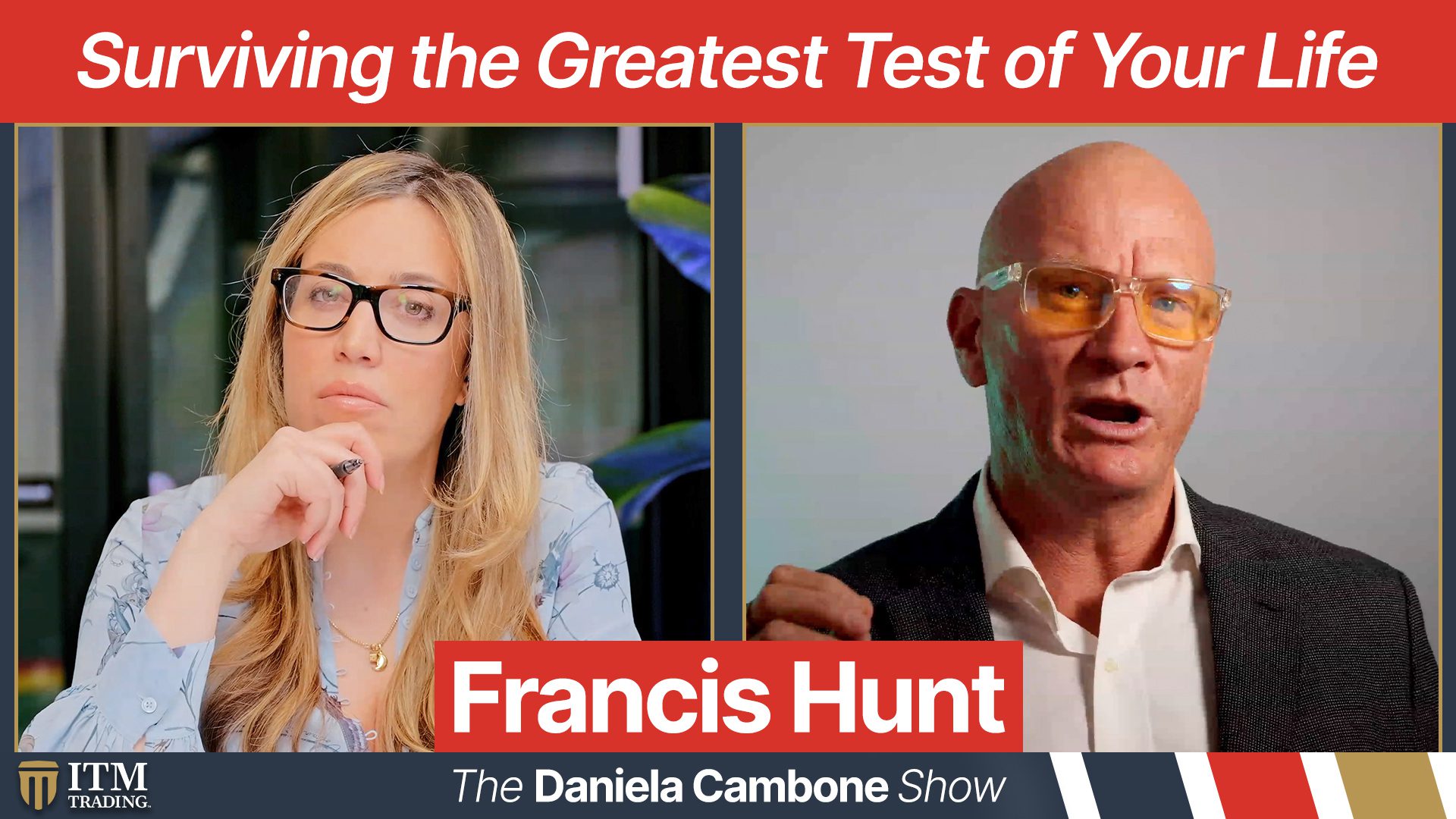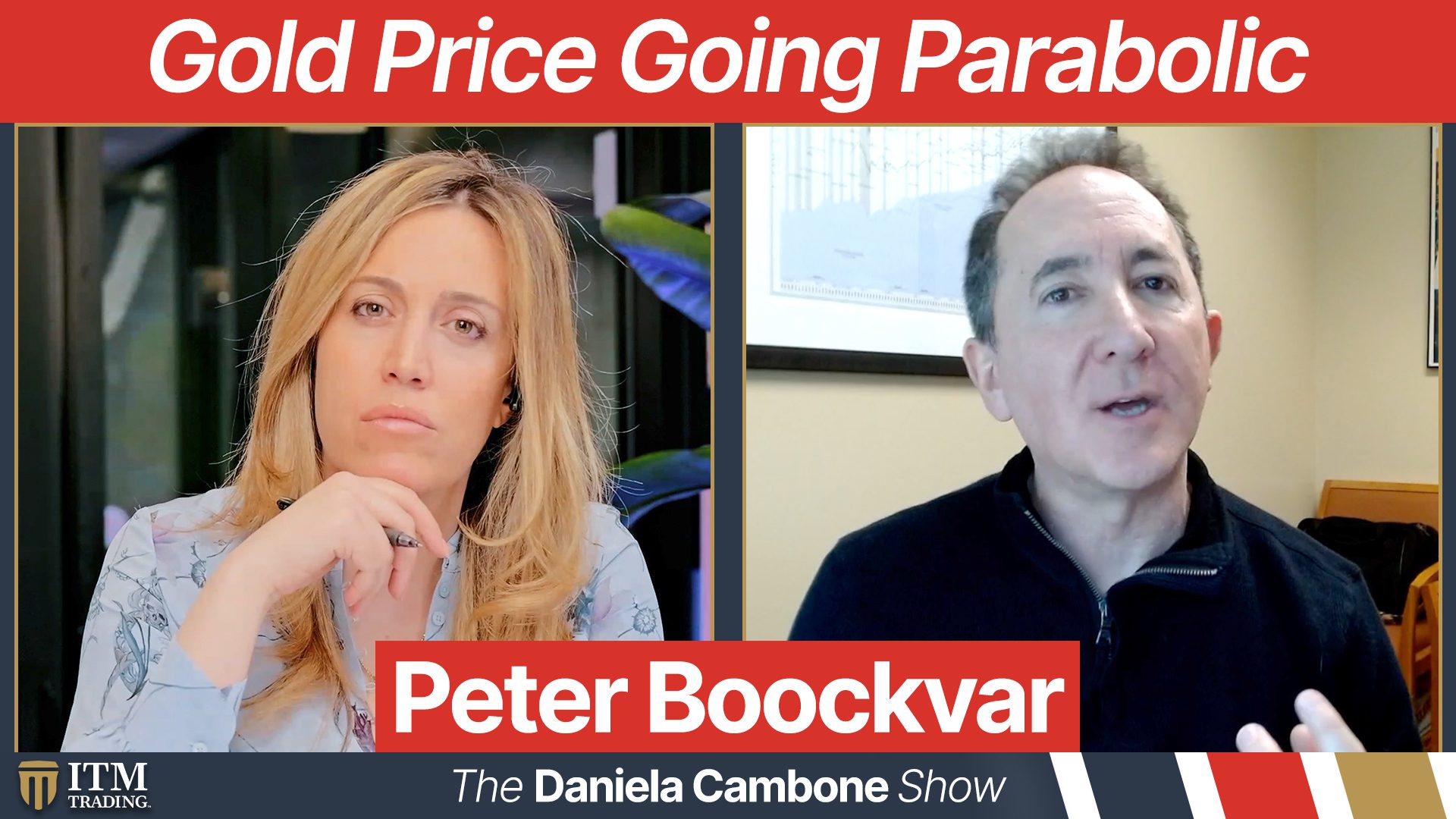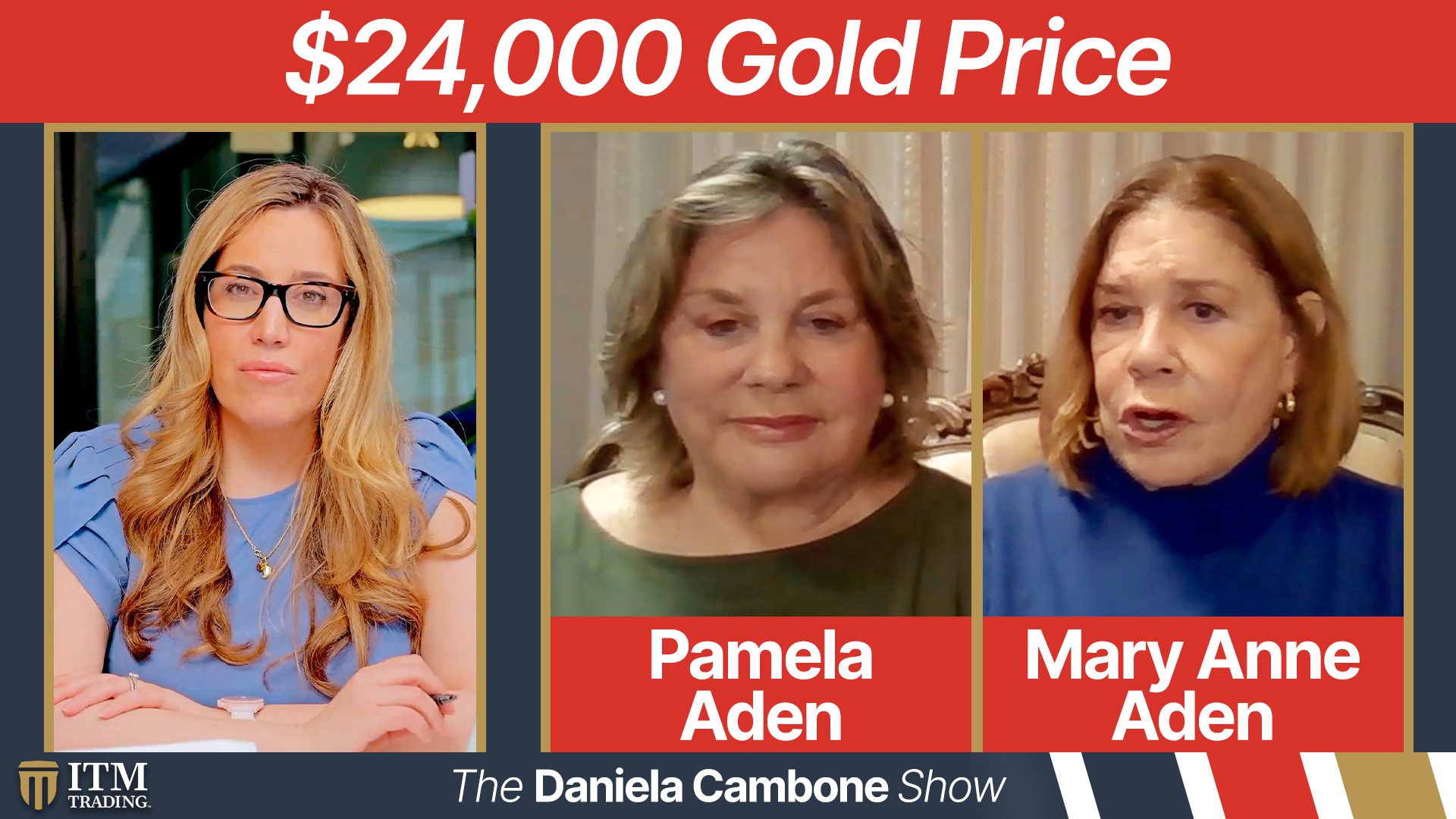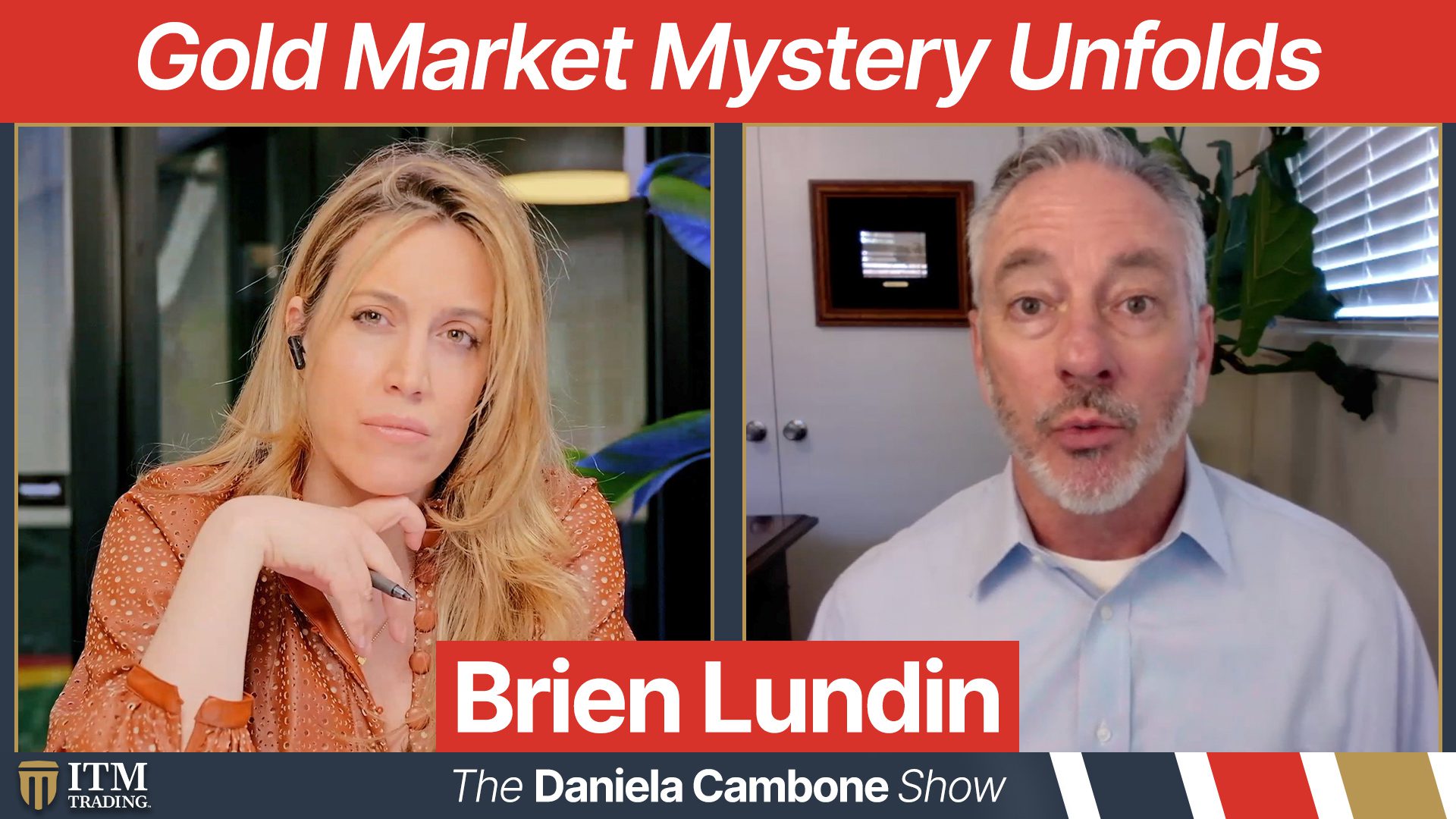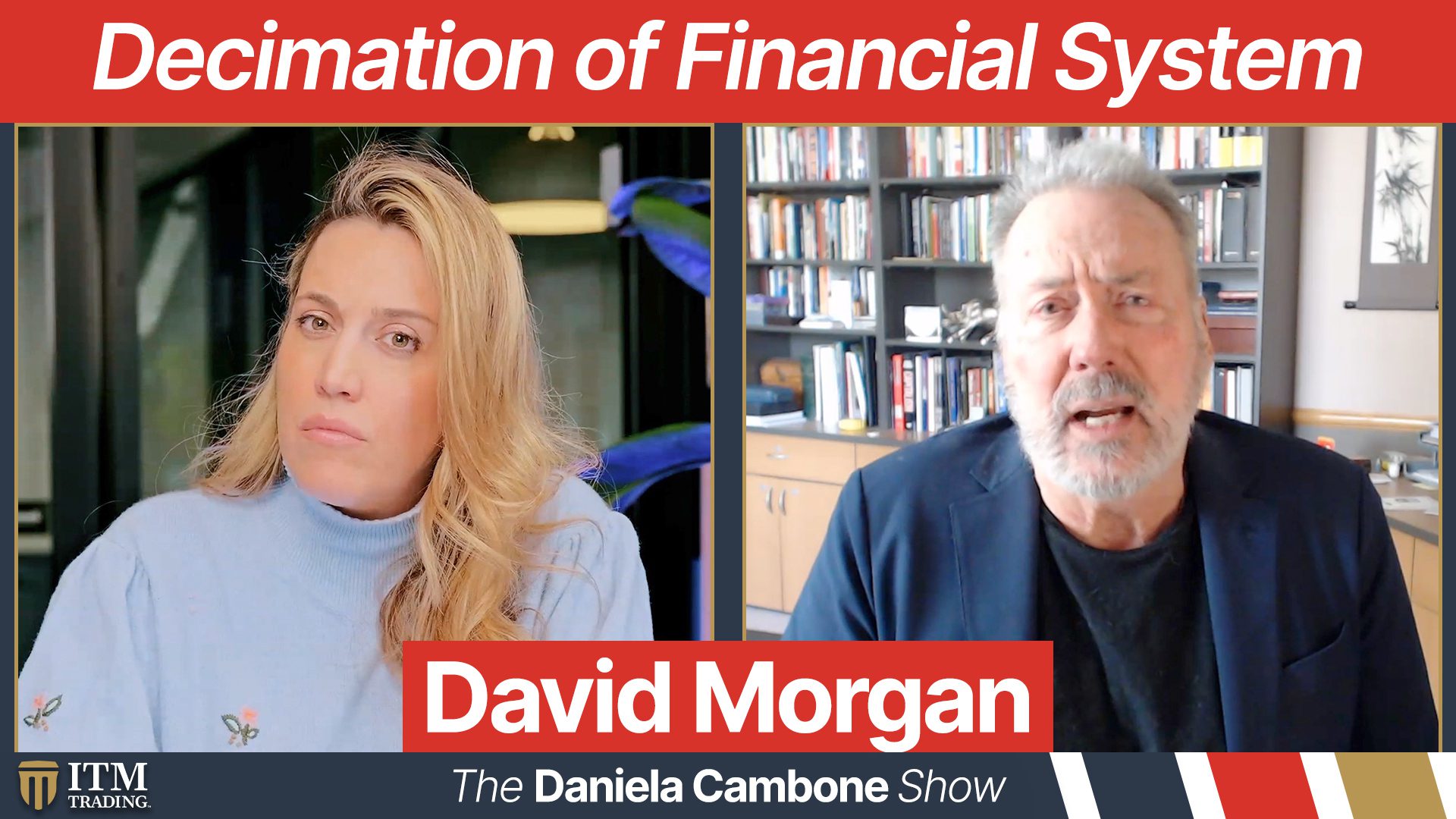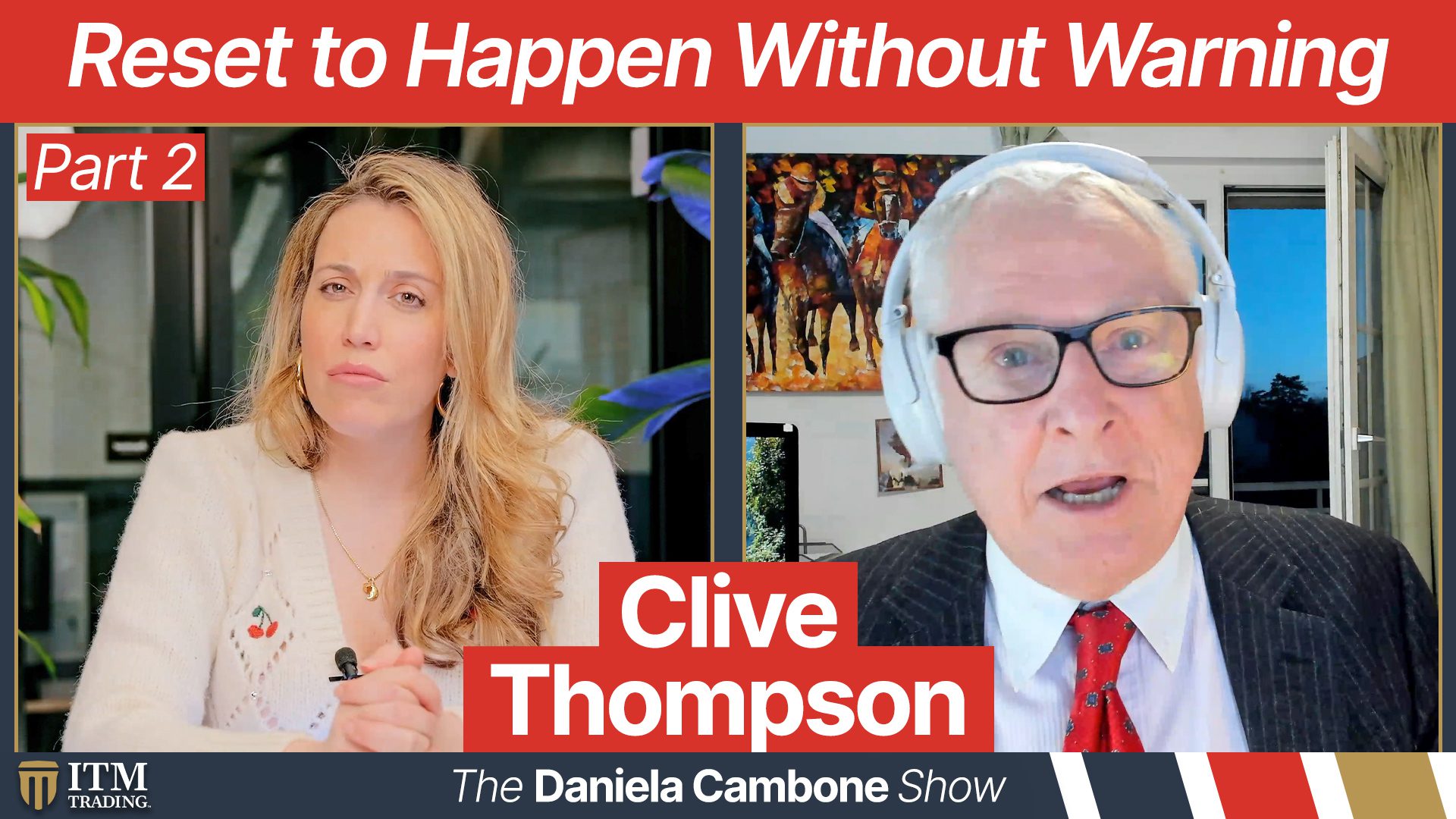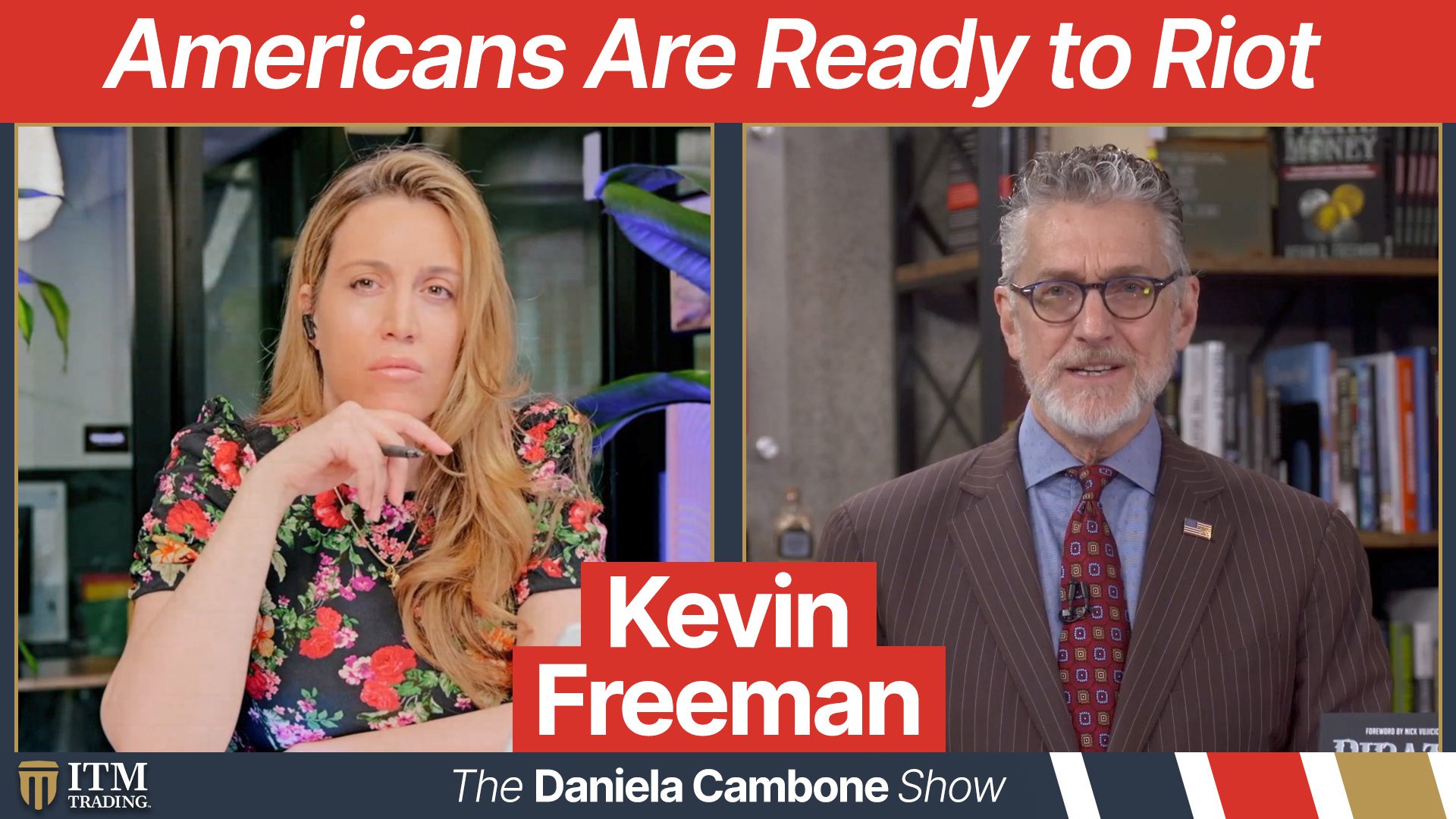“Monumental” Reset Looms, Think Twice Before Keeping Cash in the Banks Warns Swiss Banker
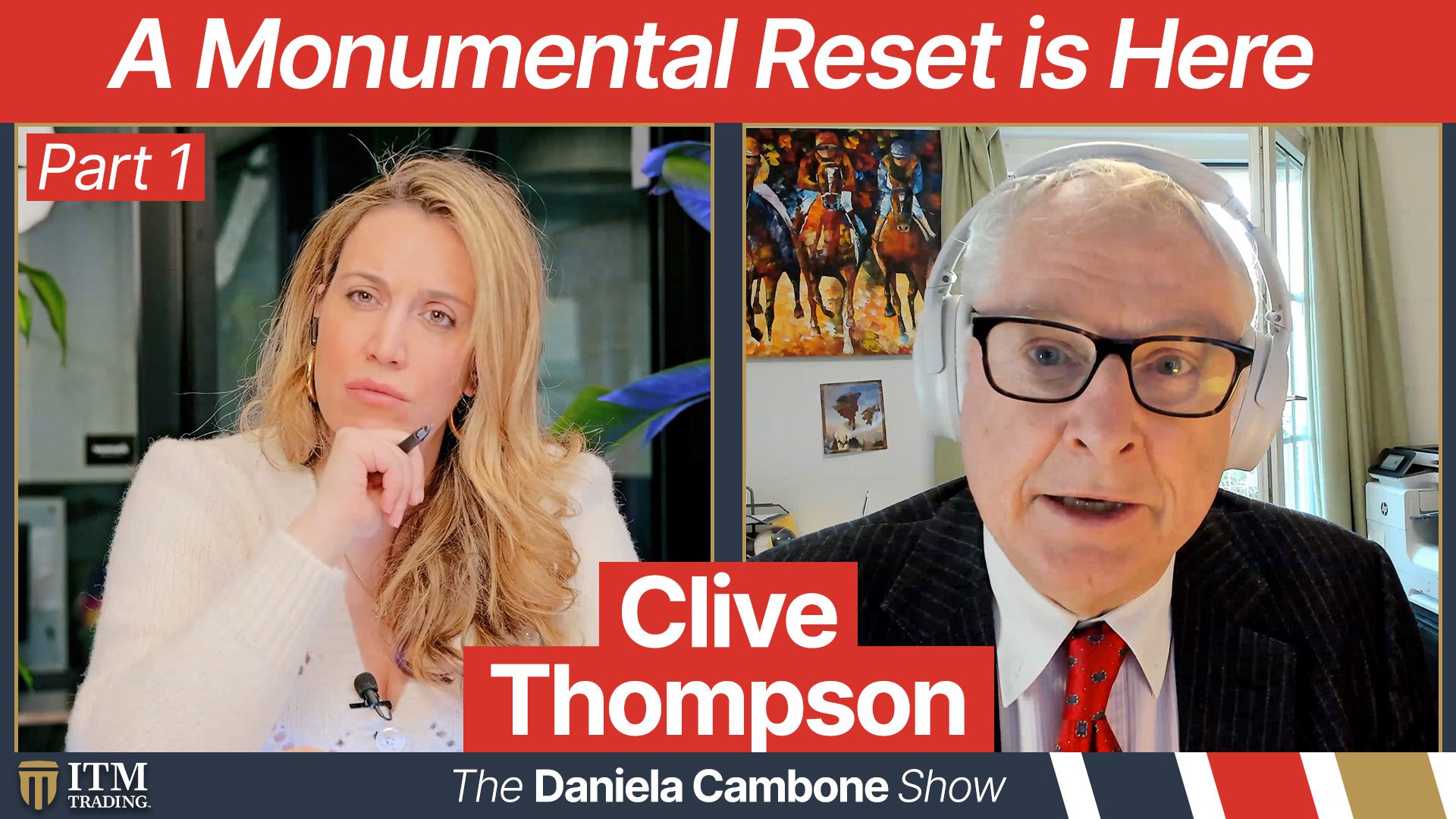
“Your purchasing power is being eroded literally by the day because the quantity of fiat wealth on the planet is going up every day,” warns Clive Thompson, retired managing director for Union Banquette Privée in Switzerland. In an exclusive interview with Daniela Cambone, Thompson paints a stark picture of our financial future. As national debts soar in the Western world, the cost of goods and services, even human labor, is destined to skyrocket. He also points out that within a century, the vast majority of currencies have crumbled into worthlessness, leaving a few survivors merely worth a fraction of their previous value. Thompson asserts that the bleak future of fiat currencies explains why central banks are amassing unprecedented quantities of gold, far beyond any previous decade. This accumulation points towards an ominous conclusion—a monumental monetary reset looms on the horizon.
CHAPTERS:
00:00 Risks associated with cash in banks
10:11 Financial reset
12:32 Risks with the banks
13:50 Fed rate cuts
15:34 Commercial real estate
16:46 Gold
26:39 Bitcoin ETFs
27:41 Trajectory of gold price
29:43 Gold confiscation
32:00 Why gold?
33:39 Bitcoin
41:36 Clive’s investment in bitcoin
TRANSCRIPT FROM VIDEO:
00:00
Yeah, the dollar’s lost 99% of its value. This is what will lead to the reset. Your purchasing power is being eroded literally by the day. Is my money safe sitting in the bank? What does gold mean for you? Why do you like it as an investment? Certainly the gold price is 100 times what it was in 1933. So there’s a reason why they’re buying the gold. The Western currencies might get into a problem and have to be reset. And if you have a lot of gold, you’ll be calling the shots. But that’s how…
00:28
a new system is ushered in. People are saying, I’m not putting any more money into real estate. The stock market, I don’t trust it anymore. Where can I put my savings? The answer to that would be…
00:47
This is Daniela Cambone. Welcome back to the Daniela Cambone Show here on ITM Trading. I think what my guest says today is extremely important and pivotal. And I urge everyone to watch this full interview completely because he says if you still have cash in the bank, large amounts of cash in the bank, you may want to be getting those deposits. It has more weight coming from the source today because he has.
01:15
close to 50 years of experience in the sector. Please welcome to the show Clive Thompson. He’s a retired managing director for Union Banquet Privée in Switzerland, having covered wealth management for most of those years. It’s a real treat and honor to have you on. Welcome to the show. Well, Daniel, thank you very much for having me. I know you’ve had some extremely prestigious guests. I feel perhaps I’m the least prestigious, but I’ll do my best for you.
01:45
Oh, I, I don’t, I don’t know about that. I was watching many of your past interviews and obviously have been reading your research and lead up to this interview. And, uh, I mean, a lot of the things you’re saying, I said, you know, I have to have you on, I want you to share it with the audience. So, you know, just to give everyone a framework, we’re going to be talking banking, obviously we’re going to be talking gold, the run-up in the gold price and where, um, Clive thinks it’s going, we’re going to be talking Bitcoin. We’re going to be talking to the fed.
02:15
And we’re gonna talk his thoughts on central bank digital currencies. But let’s start what you say is a problem facing a lot of banks and why the folks at home may wanna limit the amount of cash deposits you hold in a bank. And I say, you make the specification between cash deposits and securities, but one holds a huge amount of risk. Exactly, well.
02:39
I think there’s two risks with cash. One of course is holding it in the bank where you’re running the risk of the counterparty risk if everything goes terribly awry. Of course, every bank has some sort of guarantee for their central bank, but the central bank and in the US’s case, it’s the Federal Deposit Insurance Corporation. They only have a limited amount of reserves so they could only cope with a certain amount of banks failing. And I’m not here to tell you that the banks are gonna fail.
03:09
but I am gonna say there are problems in general with all banks at the moment with their credit book because what they’ve been doing is something which you shouldn’t do but they have done it. It’s lend long and borrow short. Now, why is that going wrong? Well, when you lend long, let’s say I give somebody a mortgage for 25 years at 5% or 6% interest rate.
03:36
That’s fine provided I’m paying my depositors less than that five or six percent or whatever the rate is that I’m earning. I like for defaults that might only be four or five percent I’m getting whatever the rate is. Now the trouble is when interest rates go up, two things are gonna happen. My depositors are gonna start withdrawing money to put it wherever they can earn the most. And secondly, the value of the loans I’ve made
04:06
because they’re at a fixed interest rate, will be going down in value. So let me give you an example. If I bought a treasury bond, a 10 year treasury bond, and I might have paid, it was paying 2% interest rate, and I might have paid, let’s say, 100% for it. Now, two years later, three years later, the interest rates on that are 4%. Well, because I could buy a different bond yielding 4%, the bond which is only yielding 2% is worth a lot less. What does that mean? It means my assets are worth less than they were.
04:36
And unless my liabilities are going down and they’re not going down because I owe my depositors short term, I’m eroding my capital. And of course you could get to the point and you will get to the point in some banks, so not all but a few banks, you’ll certainly get to the point where the.
04:53
Equity is completely eroded. And those banks, if everything runs smoothly, will be bailed out and taken over by the larger banks. The other problem which we’ve got in the real estate sector is the commercial, sorry, in the banking sector, is the commercial real estate. As we all know, after the pandemic, large numbers of people have taken advantage of the opportunity, maybe much to their employers, Shekharan, to work at home.
05:22
And that does mean that in major city centers, office blocks are nowhere near as full as they used to be. And many of those owners, the employers of those firms, they’ve got long leases which might mature in one year, two years, three years, four years, five years. They’re not going to renew those leases or not for all the floors. And they’re going to be asking for rent reductions as we stand. What that means is that the value of the real estate
05:51
for the owner is going down because when that lease matures, he’s not gonna be able to get the same rent as he got previously. He’s gonna have trouble getting tenants in it. And it’s not just the office blocks which are affected, it’s everything around the office block. It’s the supermarkets near there, it’s the food shops, it’s the restaurants, it’s the entertainment, it’s the gyms. So everything in the ecosystem around big city centers where there used to be a lot of people working five days a week are now.
06:21
facing, perhaps if people are working three days a week, they’re worth facing 60% as many customers. And that has an impact on the amount of business they’re doing, which has an impact on the amount of rent they can pay or whether they go bust. And that of course means that we will see a lot of defaults in the commercial real estate sector. That is to say the owners will basically say to the banks, I can’t afford to pay the interest anymore. And they’ll give back the keys.
06:49
We saw a few weeks ago a major New York office block was sold for one dollar, because literally it was worth a negative amount to the owner because of all the city taxes he had to pay and he couldn’t fill it with people. So for sure if banks have been lending 50, 60, 70% on some of these office blocks, they’ll be worth less than that now. And that again is eroding the bank’s capital. So I’m not trying to suggest that we’ve got a major, major problem in the banking sector, but
07:19
We don’t know where this goes. And for that, for the credit risk, I would reduce my exposure to the banks. And people are taking that advice anyway. They’re taking their money out of banks and they’re putting it into money market funds. And the money market funds are putting their money depositing with the Federal Reserve where they can earn a nice 5% without any risk at all.
07:38
So there’s that going on. The other side of the coin with money in the bank is that your purchasing power is being eroded literally by the day. And the reason it’s being eroded is because the quantity of fiat wealth on the planet is going up every day. Now, if we go back to the old economics, people used to say that was due to the amount of currency and circulation. The more they printed,
08:07
and this has been the way governments have operated ever since the beginning of time. They print money to pay the bills to some extent. The more they printed, the less the money was worth, and therefore the prices of things went up. That was inflation in the old days. We’ve got a new factor in play now, which is not only the money in circulation, but it’s the level of government debt as well. So if you think about it, let’s take the US government as an example. It has to borrow $100 to pay Social Security.
08:37
So it borrows $100 from an investor like me. I buy that bond. I know I own a bond and the government is $100 poorer, but it then spends that $100 I just give it on some social security or maybe to fight a war somewhere overseas. So the government has got $100 poorer. I’ve got $100 and the person they spent it with has got $100, that’s $200 out there for the $100 poorer that the bank, the central bank got, the, not the federal, the treasury got, the government got.
09:06
So as the government becomes poorer, that is increasing the quantity of fiat on the planet, because a bond is nothing more than a promise to pay me fiat when it matures. So as the quantity of fiat is increasing, it means that everybody on the planet is getting richer to the extent that the government is getting poorer. And the bulk government is getting poorer because the amount of debt is going up.
09:31
and up and it’s going up relentlessly, not only in America but literally all around the world in all the Western economies. So as the governments get poorer, everybody else gets richer and that means that the price of things which are in demand and that includes human labor is going to rise. But it also includes anything which is in short supply and which is in demand. So we could include that gold, we could include that equities.
10:00
we could get included that certain types of property and so on.
10:06
so much to unpack here, but I think what you’re getting to Clive is really, um, your, one of your major thesis thesis is that this is what will lead to the reset is that the debt will be, you know, unresolvable that already is, but that’s how a new system is ushered in.
10:30
Ultimately, all currencies of whichever existed, apart from the few hundred which exist today, have failed. And most of those which existed 100 years ago have already failed. And if you think about it, the survivors are worth but a tiny fraction of what they used to be worth. So if I take the dollar, for example, prior to 1933, the main currency in circulation was
10:59
the gold eagle or the double eagle. An eagle was $10, a double eagle was $20. A double eagle weighed nearly one ounce. So we’ll call it an ounce, but simply it’s so close to one ounce. So it was $20. And if you happen to have a paper banknote, that was a representation of the gold you owned. So the money was the gold, the banknote was a representation of it. But back in 1933, we were in a deep.
11:28
Great Depression and people were queuing up at the banks to withdraw their gold. And that’s when Roosevelt came to the conclusion that there wasn’t enough gold in the system. And he basically issued the executive order 6102 to recall all gold, which was in the hands of, in private hands and ordered it to be handed into the Federal Reserve. And people dutifully lined up and handed in much of their gold. We also know a lot survived outside of the Federal Reserve at the time, but
11:57
But that was $20 for an ounce. And if you tried to buy an ounce of gold today, you know well that it’s getting closer to $2,200 an ounce. I think we’re at 2,170 this afternoon. When they say as it might be a different price. So certainly the gold price is, what are we talking about? 100 times what it was in 1933. So yeah, the dollars lost 99% of its value.
12:28
Before we move on and talk more gold, I just had a few more questions on the banks and your risk being in the banks. It’s obviously tied to the interest rate environment. So talk to me a little bit about, well, first you say it’s a problem for all banks. So are you saying globally, like this is not just a North American problem. This is obviously a European problem, an Asian problem. It’s a global banking problem.
12:56
It will be, but again, I want to stress it’s not a problem of every bank. Most banks will be just fine. They’re gonna see reduced profits, but there will be some failures along the way for sure. Do you feel it will be pronounced in the United States because of the number of banks that there are in the country?
13:21
Yes, I think the banks which are most at risk are the smaller regional banks who basically are engaged in the mortgage business
13:30
Okay. And then talk to me about, um, how the risk increases or decreases based on what we’re hearing from the fed now they’ve, they’re, they’re holding rates steady for now. But, uh, Powell, you know, said last week, uh, that they’re maintaining three cuts, uh, coming sometime this year. So how does that, does that impact the ecosystem?
13:57
The high rates, which are short-term high rates, are the problem for the banks. And the reason is, when they invested their money over the last decade, they were, to some extent, the banks were investing in government bonds, they were investing in mortgages, all at lower rates than they have to pay their depositors today. So today, to compete with the Federal Reserve, who are offering everybody five, five and a quarter percent, they literally have to pay.
14:25
a competitive rate or they’ll lose their deposits. But they’re not earning that much on their loans. And there’s the problem. So it would shoot the banks very nicely to have lower rates. It would also shoot the Federal Reserve because the Federal Reserve is losing money hand over fist for exactly the same reason as the banks are losing money. Specifically, the Federal Reserve engaged in this quantitative easing program over the last decade since the banking crisis and then again in COVID.
14:55
where they built up their balance sheet with lots and lots of government bonds at very low interest rates. Yet at the same time, because they put their policy rate up to five point something, they’re paying out to their depositors a much higher rate than they’re earning. So the Federal Reserve has already lost a trillion dollars. Now you might say, well, that’s wiped out their capital of 35, 40 billion dollars. Of course it has, but they…
15:22
not booking that, like that, they’re booking the loss as if it was an asset on their balance sheet. You know, Clive, when you were talking about the commercial real estate pain that we’re seeing now, live in New York City and exactly what you speak of, does it continue in your opinion to happen as, you know, slowly as a trickle, and then will we have an eruption?
15:52
I mean, could we see another financial crisis is what I’m getting to. Eruptions usually come from the unexpected. The trickle is what we’re seeing at the moment because don’t forget, in many cases, the businesses are still having to pay the rent on their leases and provided the business is still operating and still making a profit, which for the most part they are, they can pay the rent.
16:17
It’s just that as their lease is mature, which might be five or 10 years or two years, depending how long they got left on the lease, at that point, they’ll say to the landlord, I don’t want to occupy this property or I don’t want to occupy as many floors as previously. And that’s when, so it’s slowly but surely, the value of this real estate is going to be declining.
16:41
Let me ask you, let’s go to the gold price now. I liked one of your quotes where you say, gold is breaking through all time closing highs and almost every currency, but it seems that everyone is asleep at the wheel. Almost nobody is noticing what’s going on. The mainstream press for now is silent, but you say what will happen when they start to pontificate about it. So I read this last night.
17:08
And then this morning I wake up to an article from CNBC, which, you know, traditionally has not covered gold. Um, but now their main headline article was gold prices have been hitting record highs. Here’s why the rally is far from over. And they’re talking $2,300 gold. Um, so it seems we’re here now where the mainstream media is pontificating about gold is covering gold. So now what Clive? Well, uh,
17:33
whilst we might be seeing the odd article or program about gold, it’s still rarefied air. I really don’t think that the public is in gold yet. Of course, there will be the die-hard gold bugs who are, and perhaps I’m one of those, but I don’t think the public’s in gold generally. The evidence for that is the gold flow out of the gold ETFs. Now, if we, I just looked up the
18:03
In 2023.
18:10
there were $17.1 billion of dollars withdrawn from ETFs around the world. This is all the gold ETFs, the gold ETFs only. $17.1 billion was withdrawn from the gold ETFs in 2023. And in January and February collectively, this year, it’s another $5.7 billion went out. Now, all that happened during a period when the gold price went up from $1,700 to over $2,000.
18:39
So the question which people must be thinking about is, if the gold price is going up, yet people are selling it, what’s going on here? Well, I can tell you what’s going on. The public at large, the ETFs are selling the ETFs. In other words, the ETFs then have to sell the gold, but someone out there is buying it. And let me tell you who it is. It’s the central banks. The central banks in 2022 and 2023 bought
19:06
something like 50 or 60% more gold than they had bought in any of the previous 10 years. So they’re stepping up their game in terms of buying gold. And there’s a reason why they’re buying the gold because they see that there is a risk that the currency, the currencies, the Western currencies might come and get into a problem and have to be reset. And if you have a lot of gold, you’ll be calling the shots or at least sitting at the table. And the biggest buyer is of course, the Chinese central bank.
19:37
Their gold purchases last year were at an all time record in 2023, it was more than ever before. And that’s what we know of Clive, because I always say with the recording of, you know, the central bank gold purchases, we’re just taking the country’s word for it. Yeah, there’s a lot of- There’s no actual audit. Yeah, you’re right. There’s a lot of supposition that maybe they’re buying gold.
20:06
secretly and not telling us. There is a slight disconnect between the amount of gold that China says it’s been buying and the amount of gold which has been exported to China. I haven’t got the numbers in front of me, but I can tell you a lot more gold went into China than was bought by the central bank. And Clive, and all the gold that China mines stays in China. True. Now, but there is another factor,
20:36
possibly going to be, and I’m talking a little bit in the future tense here, going to be more important than the central bank buying. And it comes down to the same thing, and the word is China. In China, and I’m talking mainly about the middle class here as opposed to the impoverished, the traditional way of saving was to buy apartments. So the middle class would own two apartments, three apartments, four apartments. The trouble is,
21:07
Real estate prices are crashing in China. All these apartments are sitting empty. The population of China is declining. Real estate companies are going bankrupt by the dozen. So, owning an apartment as a form of saving, that’s how people used to save in China, has gone out the door. It’s no longer a thing to save in the form of real estate in China. So, the next best thing must be the stock market. But that really was something which was reserved for a much smaller percentage of the population.
21:36
But are people going to the stock market in China? Well, the answer is not really because they see the less capitalist policies of the central administration as being a negative for business. Businesses, they’re coming under a lot more pressure from the central authority in China. And so people are, the Chinese stock market has been going down contrary to the rest of the world. So the worst performing stock markets are China and Hong Kong.
22:05
So people have been pulling their money out of that. So it’s not a good place for savers in Japan to park their money in the stock market. So where else can they go? So where they’re going, there’s two places they’re going. One is to the jewelry shops in China, and there’s tens of thousands of those all over China. Now, in Chinese jewelry shops, I don’t know if you’ve been to Hong Kong, you probably, if you have, you’ll know the style. It’s much more bullion style. On the wall.
22:35
you’ll see the price of gold, and then you will see the markup for if you’re buying it or the markdown if you’re selling it. And then you see something next to each item of gold called the labor charge. So you know exactly where you stand. You’re paying for the weight of gold at the price of the wall plus the labor charge. Simple as that. So it’s a much more transparent system than walking into a jewelry shop.
23:01
at least here in Europe where they just got the prices and you don’t know how they calculated it. So you know exactly how much gold you’re getting. And I’ve been looking at the six month and in some cases nine month reports of jewelry companies out in Asia. There’s a lot of jewelry shops, jewelry companies in Asia, which many which are quite somewhat in Hong Kong. The sales of gold jewelry are up significantly 40 to 60% increase.
23:31
is not surprising. Now I say that’s not surprising when I read the company reports. I did read a lot from another source that in Q4, this was from the World Girl Council, that jewelry sales were up 17% in the fourth quarter. Still a lot. So if you multiply that by four, that probably comes to about 60% anyway. So people in China are buying gold jewelry.
23:58
But there’s a second place where they can get their gold and that’s the Shanghai Gold Exchange. Well, there’s three places actually. So the Shanghai Gold Exchange, you can buy your gold, it’s T plus zero, you get delivery the same day. Now, if you go as most people would via their bank, you have to wait for the gold to be delivered to your bank to be delivered to you, takes a bit more time. But effectively, the Shanghai Gold Exchange, when you buy gold spot,
24:24
It’s T plus zero. If you sell it, it’s T plus one, you get paid the next day. And there you have to buy a hundred grams at a time. So it’s a bit more, that’s the lot price. But anybody, any individual in China can join the, become a buyer at the Shanghai Gold Exchange. I think it’s something like 10 million people doing that. So that’s a very small percentage of the population. But the third way which people can buy gold is through WeChat. So if you have the WeChat application on your phone,
24:54
you can buy as little as one gram of gold. So what I think is happening is people are saying, I’m not putting any more money into real estate. The stock market, I don’t trust it anymore. Where can I put my savings where it’ll hold its value? And I think they’re heading to gold. And I think that’s sucking gold into China from all over the world. And I think that’s part of the reason we’re seeing a rising gold price, despite the fact the Western world.
25:21
well, the whole world seems to be selling the ETFs. So I thought that was rather odd. So I went and broke that down. And when I break it down, I find that although the Western world is selling their ETFs, which about, or when the world is selling ETFs, to gold ETFs, inside that, it’s net sellers from the Western countries, that’s Europe and the United States, but net buyers of ETFs from Asia. The buying by the Asian ETFs.
25:51
in 2023 bought $12.3 billion of gold, despite the fact that the, we had 17 billion of sales globally, including Asia, but of that, those are positive 12 in Asia. And so far in January and February, the Asian ETFs have bought $429 billion, sorry, not billion, million of gold, dollars.
26:20
compared with a 5.7 billion outflow globally. Wow. So Asia is buying gold, that’s the fact. Yeah, yeah, yeah, no, I love the argument you’ve just made and the research, so few questions here. Because we often hear, oh, well, you know, the gold ETFs, they’re flowing into the Bitcoin ETFs, people are leaving gold, getting into Bitcoin. So does that squash that theory?
26:50
or is that also part of it? I can imagine that somebody who’s been very disappointed with gold over the last decade, they’re probably looking at it and saying, you know what, gold has done nothing compared with stocks. I want something which is moving. They might well shift out of the gold ETF and go into a Bitcoin ETF. I mean, it’s a very easy trade. Your gold ETF isn’t exactly in the same place as your Bitcoin ETF, i.e. on your Robinhood account or whatever brokerage account you’ve got. It’s dead easy to say, where do I get the cash to buy Bitcoin? Oh, I’ll…
27:19
Look at my goal, it’s done hardly anything about that. So yes, I think that’s part of the trade too. But I don’t think the world thinks that Bitcoin and gold are exactly the same thing. They are different things. Absolutely. And before we move on and dig a little deeper in Bitcoin, just a few more questions on gold here. I mean, you’ve made the case that China is likely the reason of the run-up in the gold price. So as.
27:47
Um, a gold buyer, Clive, what do you tell people, you know, who haven’t had exposure to gold or maybe haven’t added to their exposure to gold in a while who look at the price and say, well, I don’t want to get in now. It looks too high.
28:02
It certainly doesn’t look too high to me. You know, I think given the expansion of the central bank’s balance sheet over the last decade and the huge increase in government debt, gold has not kept pace with that. And there’s a lot of room for the gold price to go higher. And it will go higher if we have a currency crisis and there’s a loss of confidence in the currency. Why would we have a loss of confidence in the currency? Well, it could simply be that government spending is out of control. They can’t rein it in.
28:32
They’re having difficulty borrowing the money except at higher and higher rates. Then there’s a spiral down in the government bond market and people say, is my money safe sitting in the bank? Because the bank owns these government securities which are falling in price and they start to try and put it in something safer. And gold is one of those places where it might end up. It’s not the only one, of course. You shared a great chart and we’ll throw that up now where the gold price catching up with the government debt and the charts as it looks like gold could.
29:01
reached 2300 by the end of the year. I mean, looking at the momentum we have today, that seems like, well, I don’t see how we wouldn’t hit that target. Yeah, I guess the gold price was a little bit low and I did the chart a few days ago. No, no, no, and it’s not a criticism, just saying that now the needle has definitely moved. Yes, I think, you know, if we, at the time I drew the chart, I thought we could see another 7% on the gold price this year. But of course it could do.
29:31
a much bigger move if enthusiasm starts to build. So, and I’m getting to de-dollarization, but I just had another question because you are a gold bug. So I have to ask, and you brought up gold confiscation. Is that still a concern that that might happen again one day or how would it be different? I really don’t think it’s gonna happen. The confiscation which did happen in the past was because the currency was backed by gold, either government had.
30:01
gold obligations and it didn’t have enough gold. So to meet its obligations in gold, it had to seize everybody’s gold or basically exchange everybody’s gold for paper, bits of paper, so they could pay their international bills. In fact, so that basically was where we had the executive order 6102. There were two reasons for that. One, to put money back into the hands of the government and the Federal Reserve, but two,
30:30
to grease the wheels of economy, because as the gold was flowing out of the banks, there was no money to lend to anybody, and the economy was stalling because there wasn’t any money in circulation. Now we’re not in that situation at all at the moment, because the currency of, there’s no currency in the world which is backed by gold, therefore they don’t need to recall gold to.
30:57
at least to back their currency today. Now, if we go into a new situation where the currency has failed and they say the only way out of this is to have a new currency backed by gold, yes, it’s possible that some countries will go to extreme measures to lay their hands on gold because if they don’t, they won’t be able to back it. But if you look at it, the United States has got a lot of gold in the United States. When I say a lot of gold, they’d have to push the price to, depending on how much of it they decide to back. But if they just decide to back the money in circulation, let’s call it $8,000 an ounce.
31:26
If they want to back 30% of the government debt as well, we’re probably talking about $80,000 an ounce. All they have to do is change the official price of gold to some new number, and the currency is 100% backed. But other countries will have a different ratio because they have less gold or more gold relative to their currency. Obviously a country like Switzerland’s got an awful lot of gold relative to the amount of currency, whereas UK has got very little compared with the amount of currency in circulation.
31:57
You brought up an individual who might say, I don’t like what gold’s done for me the past 10 years. I want to be in something that’s going to make me money. And of course that raises the whole argument of, you’re not in gold to make money. I get it. But as a gold holder and someone who’s been in gold for so long, Clive, what does gold mean for you? Why do you like it as an investment? Well, I regard it as a very good alternative to cash.
32:28
you need to keep something which is going to hold its value irrespective of what happens to the stock market or to the value of money. And we know that the value of money, we know the direction of travel, they’re printing more and more of it. And therefore net result is what your share of cash is going down by the day. So that’s not a very attractive proposition for large amounts. You’ve got to keep enough for your day-to-day spending and for some emergencies or some future spending needs. But once you get beyond your…
32:56
for seen needs in cash, the surplus ought to be invested in other things. And gold is one of those other things. I don’t really see gold as being a, I don’t see this being the most attractive investment as such, but I do see it as an attractive investment for its stability, for its longevity. So in that respect, I like gold. But again, I would say it’s more.
33:23
I don’t want to have bonds really in today’s environment. I don’t really want to have cash. So I’d say it’s to some extent filling that space. Excellent. Which brings me to my point on Bitcoin. You say some of the early ETF investors will be showing profits of over 40%. The temptation to take profits must be growing. And when that happens, the Bitcoin price, we might see it stall. And that will bring out many sellers due to fear, uncertainty and doubt. Talk to me about…
33:53
your forecast for Bitcoin. I mean, we have a having coming up in April. What could that do or just general thoughts on Bitcoin here?
34:02
I think there was a watershed moment on the 11th of January this year, which was the moment that the SEC approved the 10 US ETFs. That’s changed everything forever. And the reason it’s changed everything forever, it has now made exposure to the Bitcoin price easily accessible to everybody who ever had a brokerage account. In other words,
34:30
It doesn’t matter whether I’m in the United States or UK or Switzerland or Thailand, everybody who ever traded stocks will have traded US stocks because everybody in the world’s got access to US stocks. And if you can trade US stocks, you can now also trade Bitcoin, at least Bitcoin ETFs, which hold the Bitcoin, without the complications of having to learn about private keys, without the complication of having to go and open up an account at a strange crypto exchange where you haven’t got any money, without the complication.
34:59
of self-custody, in other words, you can buy your Bitcoin ETF in exactly the same way as you bought your McDonald’s shares, your Coca-Cola shares, your Berkshire Hathaway shares, it’s moved into a certain normality. So what’s that done for Bitcoin? It’s moved it into a valid asset class of its own. I mean, there is another asset class out there called crypto, which I’m not.
35:26
putting Bitcoin into the crypto asset class, it should stand alone. It’s a bit like saying gold is a commodity. No, Bitcoin’s a crypto, but it’s like saying gold is a commodity. You say gold and commodities or Bitcoin and crypto, I think. So Bitcoin is now an asset class on its own, which can be included in the asset allocation of large investment firms. Now, most investment firms are gonna take a long, long time to authorize
35:56
that particular ETF to be added to their approved list. So when you work in a financial institution, every financial institution will have two types of lists. One is called the approved list, and the other one is called the recommended list. The recommended list is what you have to tell your clients, our bank recommends this stock or that stock, and the approved list is where you can talk about it and say, well, it’s not a bank recommendation, but as you’ve asked me about it, we authorize you to buy it.
36:27
It’ll take a long time for the Bitcoin ETFs to be put on the approved list of many, many large financial institutions. And the reason for that is to get on the approved list, you have to go through, for anything, especially a new ETF, you have to go through a number of departments. You’ve got the legal department who’s gonna be checking whether the bank has got the right, would have the right sort of custody of it. You’ve got the compliance department to see if it’s gonna be legal.
36:56
and correct to do it in the country that you’re dealing with. You’ve got the risk department, who’ll be looking at the risks to the client of losing money or how much money they’re gonna lose and whether it’s excessive risk. You’ve got the, probably in many firms now, you’ve got the ESG department, which is gonna be looking at things like whether Bitcoin uses too much electricity and so forth. And lastly, you’ve got the senior management who’ve got to say yay or nay to something as controversial as Bitcoin. So getting through all these departments,
37:25
takes a long time. On the other hand, there’ll be huge demand from the investment managers and for the relationship managers to have it approved. Why did they want it to approve? Because everybody liked something new and different to talk about with their clients. And I think most investment managers are pretty smart cookies and they’d like to have, I won’t say all of them, but a good number of them would like to have a little bit of Bitcoin in the portfolio just to spice it up. And when they go and see the clients, they can have a chat with them and.
37:53
and it’s great fun to see a client and the client says, oh, my great grandson bought some Bitcoin and he said, oh yeah, but you’ve got some too. So the relationship managers would like it in the portfolio but they’re not allowed to do so until it’s gone through all this compliance approval process and it takes time, it takes a long time. So little by little, it’ll be added to the approved list and in some cases added to the recommended list. And
38:20
Then it’s down to the relationship manager or the portfolio manager to decide if he either advises the client to buy a little bit or whether he says I have the discretion to buy a little bit. And then if he’s got that power, how much will he put in? Well, probably I think a lot of people are gonna be very cautious. They’re gonna put a little bit in. They don’t want to be first, they don’t want to be last. So they’re putting a little bit in. But over time, the number of firms which have authorized it will be increasing.
38:48
and the number of investment managers who think they should have a little bit will be increasing. And third thing, the amount that they would put in the portfolio will be increasing. So if today they might be happy with a quarter percent or half percent or one percent, tomorrow they might be happy with two percent. Next year, three percent.
39:08
So hence a bullish case for Bitcoin. That’s right. So I mean, obviously there’s gonna be, there’s gonna be some very bad moments. So let’s just make the point about what could go wrong.
39:20
If we had a major hack and we’ve had a lot of them in the past, the Bitcoin price goes down. It’s happened over and over again. We get a hack, Bitcoin price goes down. It comes back again over time, but that’s what happens in a hack always. If we have some sort of negative news out of a major government, US, China, Japan, somewhere on the planet, Europe.
39:45
they ban it in a country, ban it in a region, or maybe they tax it too heavily or something like that. Of course, that’s gonna affect the Bitcoin price. So there’s a lot of things which could happen, which are negative, but at the same time, we have this investment flow into the ETFs where more and more firms are adding the Bitcoin ETFs to their approved list, where the individual investment managers are putting.
40:12
some amount of Bitcoin ETF into the portfolio or some of the investor managers will do so. And over time, some more will put some in and over time, some of the ones who put it in will increase their exposure. So all of that’s a bullish case for Bitcoin in a scenario where we know that the number of Bitcoins are not going to increase to meet that demand. So what we’ve had up until now with the Bitcoin ETFs with the exception of the last few days is
40:42
the demand to buy bitcoins from the ETFs has been close to 10 times the amount of newly-bought bitcoins.
40:52
And that’s been a rising trend apart from the last few days where it fell quite heavily. Now, I think we’ll see that demand run back. I mean, the reason for the fall itself brings out sellers. Every time Bitcoin goes down, a lot of people say, oh my God, did I make a mistake? Sell it quick. It’s gonna go down to, and then they look up the, look up, do a Google, and they find some number they don’t like and sell it immediately.
41:18
And then when it’s going back up again, they think, oh God, I made a mistake selling it, they’ll go back in again. Meanwhile, of course, every fall brings out some of the investment managers who missed the boat in the early stages of ETFs who will now say, oh, I’ll buy in.
41:34
So knowing that Clive, does that make you an investor in Bitcoin?
41:40
So the answer to that would be yes, but again, you’ve got to manage your risk. Bitcoin has gone up an awful lot, and that means anybody who bought it three months ago, or actually two months ago, if you talk about the 11th of January, when the Bitcoin ETFs came out, are already 50% plus in profit. So do they now own too much Bitcoin? And those who bought Bitcoin before the ETFs came out, and they’ll be…
42:09
a lot of people, millions of people out there who bought before the Bitcoin ETFs came out could have bought it at considerably lower prices, which means that they must be considering top slicing their holdings. So am I a holder of Bitcoin? Yes, I think it’s a good idea to hold it. I do hold it. Would I be a seller of it? Sure, if it goes up, I’d sell a bit, but I wouldn’t sell it all. I’d keep most of it, all of it, not maybe most all for the long term, because I do think it’ll be at a higher price down the line.
42:38
That’s not an investment advice. It’s just a personal opinion. Yeah And again two very different reasons to own Gold versus Bitcoin. I mean always goes, you know for gold that always goes back to your main point that central banks are buying gold Yeah, can I just make maybe make two arguments because I often see arguments that why bitcoins good and A lot of people have negative comments like it’s all a Ponzi scheme. It only relies on the
43:07
finding someone who’s smart, someone who’ll buy it off you. The two reasons why I think it’s worth holding some Bitcoin for everybody. I’m here, I’m not talking about the ETFs. I’m talking about holding it directly with self custody. The first reason is Bitcoin is the only asset where you can move from A to B, that could be country or continent, with your wealth in your head and not have it subject to seizure as you pass the border.
43:37
Now, you live in a very safe country, I live in a very safe country, but many people around the world are living in great turmoil.
43:47
Those who are wealthy enough and know what they’re doing would be well advised to have their wealth or what they have of it in Bitcoin because whilst their home might be at risk of being ransacked, whilst they might be stripped and all their wealth taken off them if they try to flee to another country, they can move from country to country with a Bitcoin in their head and nobody’s any the wiser so they leave with nothing.
44:18
or no visible wealth on them, but when they arrive, they’re able to arrive rich. That’s one of the uses of Bitcoin, which I think has a value. And so I would say to anybody, first of all, to anybody who, even if you don’t like Bitcoin, at least teach your children how to self-custody. It might one day save their wealth. I mean, you teach your children to swim, you don’t expect them to drown, but you never know.
44:47
it might save their life if they can swim. Same thing, teach your children to self custody, you know, for a hundred bucks. If you do that, it might become important one day to start self custodying your assets in a hurry. And the way you self custody, of course, Bitcoin would be the obvious way to go. I know there’s lots of other cryptos out there and people are gonna make all sorts of comments about those, but let’s just talk about Bitcoin. So parents should be teaching their children.
45:14
and I’m talking about children old enough to understand what they’re doing, that you could have a Bitcoin wallet, you could store some wealth in it, it’ll still be there tomorrow, a year later, five years later, 10 years later, it will not have been eroded by inflation, it will in all probability maintain its value. Well, of course, we talked about it going up in price as well, but it’s not a one way trip, we don’t know that for sure. But that’s the first reason. And the second comment about Bitcoin, and this is to do with the price.
45:44
I think there’s a network effect. The reason I would be willing to take Bitcoin off somebody is because I believe that I can pass it on to somebody else and they’ll be willing to accept it. That’s the reason I accept cash. If someone will give me $100, a check for $100 or $100 in cash, I’m willing to take it and give something in exchange because I am very confident that I can take that worthless bit of paper, which has got no backing whatsoever.
46:13
and give it to someone else, and they’ll give me something of value for it. So if I want to buy a hammer, I can take my banknote and I’ll get a hammer for it. Likewise, the same applies to gold. One could say it’s got no fundamental value, it’s got no income, it’s got no practical use, but everybody will take it. Why will they take it? Because they trust that someone else will take it. And the same applies to Bitcoin. There’s more and more people every day on the planet who are prepared and willing to take Bitcoin as a store of value.
46:43
Not to buy a cup of coffee, that’s not where we are. That’s why would anyone use the soundest money on the planet, buy a cup of it wouldn’t happen. But they’ll take the Bitcoin and give me something of value in exchange for it. There’s millions and millions of people on the planet who will do that and that number is growing and that’s the network effect. And as the number of people grow, that makes it more valuable to all of us because the number of people we pass on to increases.
47:11
Clive, I’m going to wrap part one here because we still didn’t get to talk de-dollarization central bank digital currency. So let’s wrap part one and folks, you’re going to have to stay tuned for part two. Hang on. I invite you to reach out to one of my wonderful colleagues at ITM training. You can book a Calendly appointment. It’s a calendar appointment. There’s a description below in the video. I invite you all to do that. It’s really a great experience.
https://www.gold.org/goldhub/research/chinas-gold-market-2023-demand-improved-and-premiums-rose
https://www.linkedin.com/feed/update/urn:li:activity:7169960637018664960/

